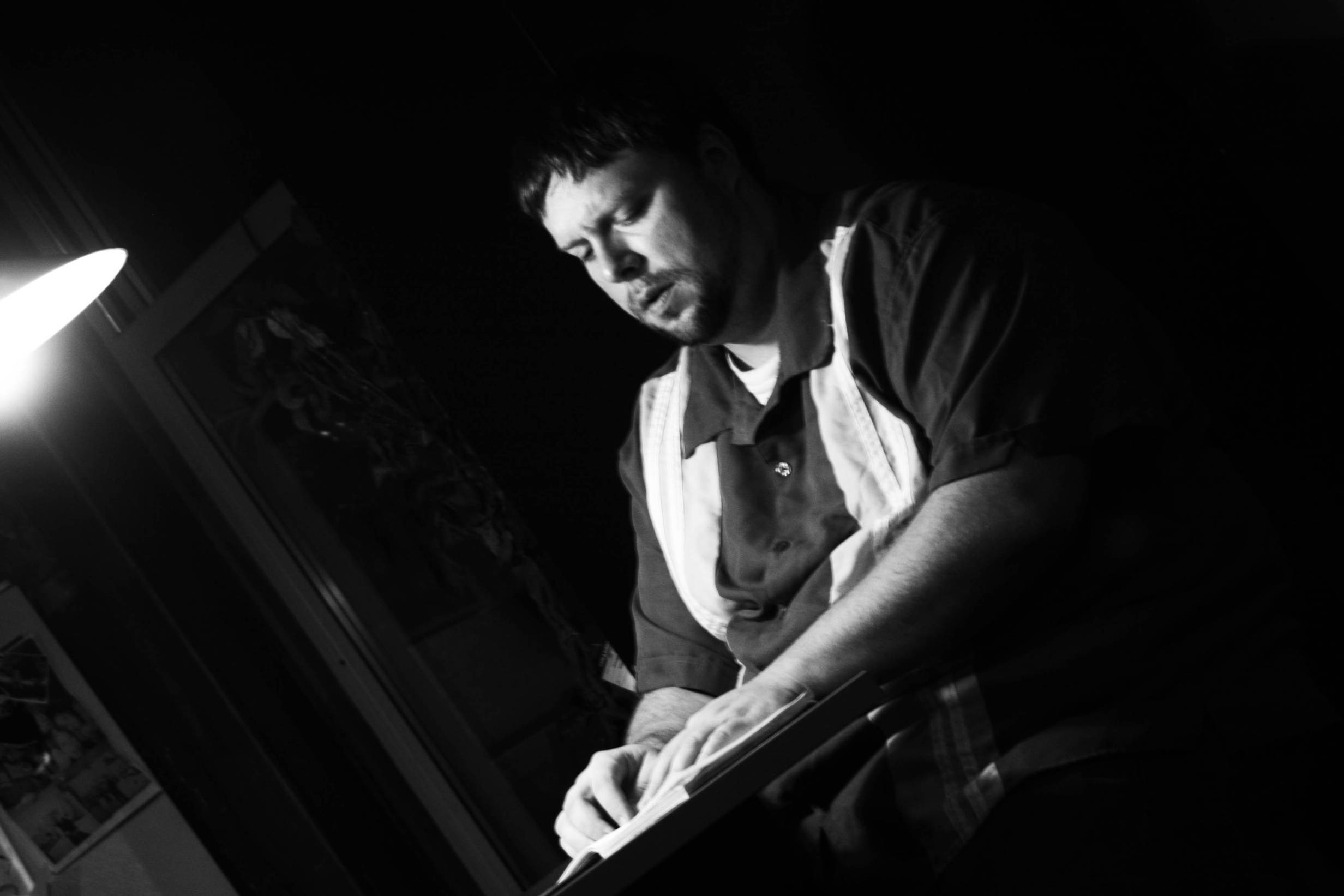 I have to admit to some trepidation as I climbed the stairs to the loft. I knew the evening involved theater in someone’s “living room.” But for all I knew it was some kind of retro-’60s confrontational happening involving hippies shrieking hallucinatory Maoist insults at a quivering jelly-blob bourgeois audience, which would include me and my lovely companion. I straightened my back, lowered my chin, and prepared for whatever I might face.
I have to admit to some trepidation as I climbed the stairs to the loft. I knew the evening involved theater in someone’s “living room.” But for all I knew it was some kind of retro-’60s confrontational happening involving hippies shrieking hallucinatory Maoist insults at a quivering jelly-blob bourgeois audience, which would include me and my lovely companion. I straightened my back, lowered my chin, and prepared for whatever I might face.
I’d taken yoga classes, after all. I could breathe through just about anything. Maybe even Maoists. But, as I discovered to my delight, deep breathing wasn’t needed. The first indication that this was the correct apartment was that it was much nicer than the average Maoist likely prefers (their tastes, I believe, run to ebony-colored walls and farm implements for furniture). The second indication that all was well was Cara Maurizi, who greeted us warmly and then led us to the living room. Ms. Maurizi, it turned out, was not only a founding member of the CoMMoN Theatre Project, but also a cast member of the play Closer, written by British playwright Patrick Marber, which was to be performed that night.
CoMMoN Theatre Project is only a couple months old, and Closer, which ran only this past weekend, was its first production. We learned just prior to the performance during a reception that the group was founded by Cara and Robb Tobias, who was also generous enough to provide his own home as a venue for the first production. Though in time they would like to have their own space, for now the company performs in private homes (even yours, if you wish). They have made a virtue of necessity by adapting the play to its surroundings rather than creating surroundings that match the play. According to Cara, one of the biggest challenges for Closer was the lighting, and indeed the lighting was composed of ordinary lamps and strings of white lights. But it worked just fine, as we would discover later. Two added pleasures of the evening would turn out to be original music by The Jezebelly and the original photography of Ellen Thomas and Patrick Keane.
We were joined at one point by Niccole Powers, who played the role of Alice in that evening’s performance. The subject of rehearsals came up. The cast had only had five weeks to put the show together. Because of time constraints, the cast often had to meet two at a time to go over their scenes, as most of the scenes involved just two persons anyway. Cara and Niccole would even rehearse while their kids played together.
There were about a dozen people in the audience for this sneak preview on Thursday night, seated on an eclectic variety of chairs. There was a real feeling of coziness about the room, perhaps because it was smaller than the cavernous spaces that sometimes pass for lofts, perhaps because it was warm inside and from the windows the chilly orange glow of Neil Street could be seen.
And then there was the food catered by Mr. Tobias and Boltini Lounge. I don’t know if the reception that precedes each performance will be similar to ours, but on this night there were cucumber sandwiches and bacon, date and blue cheese sandwiches, and other fare. Pekara Bakery provided dessert items, including chocolate-covered macaroons and some dead-serious, fantastic chocolate cupcakes.
From the beginning of the drama I could see why any actor would love to play one of these roles. The dialogue — often funny, sometimes vicious — was always compelling. The characters themselves had enough complexity and consistency to stimulate continued interest.

Closer is about love and relationships, but whether there is much of either in the events that unfold is up to one’s own interpretation. Of the four characters, three deal directly with surfaces as a way to make a living — Larry is a dermatologist, Alice is a stripper, Anna is a photographer. The one character who might go beneath the surface, Dan, a writer, is at the beginning of the play stuck writing obituaries. This consists of wrapping the deceased in a shroud of code phrases: if the departed was “convivial,” for example, that means he was an alcoholic. When Dan writes a breakthrough novel, it is based on the life of Alice, who, as it transpires, is a work of fiction herself. To a great extent, the play is about surfaces and the inability to go beyond them. It’s no accident that the film version of the play was made with some very pretty people indeed, including Julia Roberts and Jude Law. Their attractiveness both reinforces the theme and distracts from the sheer ugliness of the character’s failure to love, to become “closer”. (A production cast with paunchy retirees, though it be just as true to the emotional dynamic of the play, would be nearly unbearable to watch, even if, to the right kind of audience, it might have its own unique charm.)
This production, though, was excellent. No real lights, no set beyond light bits of furniture the actors moved themselves, not much more in the way of costumes or makeup — yet there it was, the real magic that live theater can produce. In addition to Cara Maurizi and Niccole Powers, Mathew Green and Matthew Fear contributed compelling and completely believable performances. In one particularly deftly acted scene, the character Anna maintains a dialogue with each of the men, though she’s speaking to them on different days. This is done without any loss of verisimilitude. Another wonderful scene involved laptops and a live chat porn site.
After the show, an enjoyable discussion was held with the cast members, followed on this night by an adjournment to Boltini Lounge. It is part of the complete package for CoMMoN productions to be preceded by a reception and followed by a discussion. It was a fine way to finish up a stimulating night of theater, one it is hard to recommend too much.
—
To inquire about future performances by the CoMMon Theatre Project, or to suggest a venue for a future performance, please contact cara.maurizi [at] comcast [dot] net.
Bottom cast photo by Patrick Keane. All others by Ellen Thomas.








